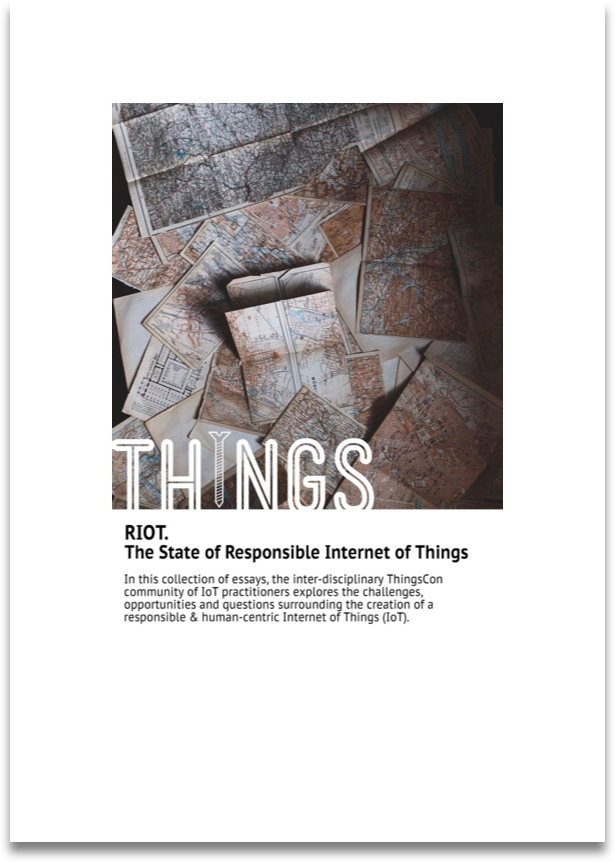
or click below to
The ThingsCon report The State of Responsible IoT is an annual collection of essays by experts from the ThingsCon community. You can find all other year’s issues in our publications section.
The State of Responsible IoT 2017
It’s a critical time in the development of the Internet of Things (IoT). We believe the ThingsCon community has a valuable contribution to make to ensure a future where IoT works for everyone: A responsible & human-centric IoT.
As part of our advocacy this key issue we gathered contributors from across the ThingsCon community and put together a report on the state of responsible IoT.
This report is a collection of essays and articles by experts from a wide range of disciplines covering a wide range of topics, issues and questions around responsible & human-centric IoT.
We find it important to cover a wide range of issues and perspectives—disciplinary, regional, cultural—and so asked authors to take a high degree of freedom. The collection encompasses very different voices: Essays range from bird’s eye perspective to hands-on advice; some stem from an academic context, others are grounded in practice.
We see this is a first step on a longer journey—a kickoff if you will. We will keep adding to this collection: As the questions surrounding responsible IoT change, so will this project. We will continue to do this as much in the open as possible (see the section “Keep it open!” below).
Content overview
The links below go directly to the articles on Medium.
Alexandra Deschamps-Sonsino: The Whole Internet of Things
In IoT, the issues and challenges aren’t the same for everyone. To strengthen the whole industry we need to build bridges between communities of practitioners.
Prof. Andrea Krajewski: User Centred IoT-Design
Designing IoT for user needs and user empowerment is the responsibility of designers.
Christian Villum: Designing the Digital Futures We Want
We can design better futures by putting people first.
Dietrich Ayala: Trust, Lies and Fitness Wearables
When designing wearables, especially fitness wearables, focus on your users’ goals—and trust them.
Dries de Roeck: On IoT Design Processes
The key to developing an IoT design process—and a successful IoT product—is to focus on user research.
Dr. Gaia Scagnetti: The here and now of dystopian scenarios
IoT mediates our relationship with the world. What if the difference between a traditional object and a smart one is that one talks to you while the other talks aboutyou?
Holly Robbins: The Path for Transparency for IoT Technologies
As connected technologies have an ever-larger impact on society they need to be transparent and legible.
Iskander Smit: Touch base dialogues with things: Responsible IoT & tangible interfaces
As we develop a closer relationship with wearable technologies, the UX of touch interfaces becomes a focal point of responsible IoT design.
Jorge Appiah: IoT in Africa: Are we waiting to consume for sustainable development?
How can IoT and its production be shaped to truly and sustainably benefit Africa?
Max Krüger: Expanding the boundaries for caring
Can connected technology also help us improve connection between one another?
Michelle Thorne: Internet Health and IoT
The internet is a public resource and IoT emerges as the next front in the battle for a healthy internet.
Peter Bihr: We need more a more transparent Internet of Things
In order to deserve consumers’ trust, IoT needs to become more transparent and legible. Consumer trust marks offer a promising path forward.
Rob van Kranenburg: How to run a country (I know where that door is)
A personal journey of discovery, and a heureka moment about the Internet of Things.
IP protection in the Internet of Things is unusual in that it engages all intellectual property rights in more or less equal measure.
Simon Höher: Controlling Machines—AI, intentions, and games and in the IoT
Does our technology have intentions, and how can we be deliberate about using, engaging with, or hacking the technologies in our lives?
Usman Haque: How Might We Grow Diverse Internets of Things? Learning from Project Xanadu & the WWW
How could we design IoT to be different—to be truly radically and legitimately collaborative? Ted Nelson’s vision of Project Xanadu offers some inspiration.
Keep it open!
We believe there is an inherent value in openness, and in working in public.
- License: All contributors kindly agreed to publish their pieces under a Creative Commons license (CC by-nc-sa), so you can share the content without asking permission. (Please reference the author.)
- Available online for free: For comfortable reading, we publish this as a publication on Medium. It’s a great platform for authors. If you prefer, you can also download a PDF.
- Powered by Github: We also keep all content in a Github repository (in Markdown) to make updating extra easy, and to allow for extra-easy future contributions and collaborative editing.
Contributors
We thank our initial contributors (in alphabetical order):
Alexandra Deschamps-Sonsino, Andrea Krajewski, Chris Villum, Dietrich Ayala, Dries de Roeck, Gaia Scagnetti, Holly Robbins, Iskander Smit, Jorge Appiah, Max Krüger, Michelle Thorne, Peter Bihr, Rob van Kranenburg, Rosie Burbidge, Simon Höher, and Usman Haque.
About this report
This report is licensed under a Creative Commons (CC by-nc-sa) license. Please reference the author by name.
ThingsCon is a global community of IoT practitioners dedicated to fostering the creation of a human-centric & responsible Internet of Things. Learn more on ThingsCon.org, join an event near you, and follow us on Twitter.
To link to this page, you can also use the shortlink bit.ly/riot-report.
Get in touch
We love to hear back from you, be it with feedback or because you have a contribution to make.
- If you would like to reproduce individual pieces, please get in touch with the author directly; all rights are in their hands.
- If you’d like to contribute a piece to this essay collection, please get in touch (info at thingscon.org).
For any other question, please also get in touch on any channel (@thingscon on Twitter or by email, info at thingscon.org).
